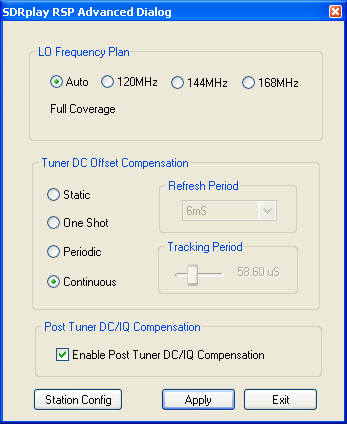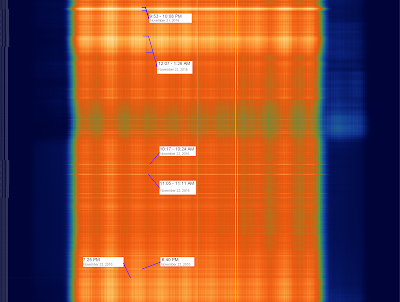My last long-term waterfall post was about the double CDMA2000 signal near my house. After more reading, I'm convinced that it's 3G EV-DO (data only). The voice and texting signal is completely different. In that last post I thought the signal carried voice and texting and was surprised to see the activity pick up late at night, but someone told me that it must be phone updates, which would make sense for 3G data. Yesterday I started a 24-hour waterfall of the CDMA 1x signal near my house.
I wanted to know which network I was receiving, so I checked both Verizon and Sprint coverage in my city. Verizon covers the whole area while the nearest Sprint service is 7 miles away and the next closest coverage zone is 20 miles away. Guessing based on the incredible Verizon signal strength reported by an old flip phone, this signal must be Verizon.
Just like last time, I disabled Tuner AGC so we could see the tower's dynamic power changes. I also had trouble with the DC spike, so I used the SDRplay's options to get rid of it. I could've used HDSDR, but I may want to record this sometime and HDSDR doesn't apply its IQ compensation to recordings, so it's good to know how to do it in hardware.
This waterfall spans 24 hours, from November 21, 2016 at 9:17 PM to 9:17 PM the next day. Each vertical pixel represents 1 minute, +/- 1 or 2 seconds. Center frequency is 874.8 MHz. Waterfall bandwidth is 2 MHz with a signal bandwidth of about 1.25 MHz.
Tuesday, November 22, 2016
Verizon 1x Voice/SMS 24-hour Traffic Waterfall
Sunday, November 13, 2016
Radio sounds in music
I noticed that certain music contains sounds you'd recognize if you do SDR.
Why is this significant? Because I recently heard an obscure Japanese song that sounded quite similar (below).
(Below) Not as cool, but something to mention:
1. ItalyCable excerpt ≈ some Japanese song
On May 27, 2015 I was using a WebSDR and heard an unfamiliar time station called ItalyCable on 10 MHz. It played some really nice music so I took a recording. I saved it but forgot where and thought I had deleted it, but today I found it in a DriveImage XML hard drive backup. The recording was taken around 3 PM Eastern Daylight Time, although you should be able to pick out the UTC time if you understand Italian.Why is this significant? Because I recently heard an obscure Japanese song that sounded quite similar (below).
(Below) Not as cool, but something to mention:
2. Intro and chorus of Kiiara's "Gold" ≈ encrypted police walkie-talkies
It's not exactly like police radio because while the speech is scrambled, the tune accompanying it makes sense. See the video: https://www.youtube.com/watch?v=sO9cBXRcBvo
Sunday, November 6, 2016
Fixing Commotion internet radio on Windows XP
I've been busy lately so it's hard to find time to write posts. I've managed to look over some C# code by Lucas Teske and write a low-pass filter for my Java Costas loop. I did get some cool output in Audacity that looks kind of like digital symbols at the beginning.
What I'm mainly writing about, however, is a quick hack I learned about Commotion Internet radio. I wanted to listen to a station called Way FM on my Windows XP computer, but it wouldn't work in Opera or IE. The page remained silent without giving any errors. I was able to make it work on my Windows 8.1 tablet (Opera), Windows 7 x64 PC (Opera), and ZTE Sonata phone (the app), but it stubbornly refused to work on Windows XP. Using a mobile phone or tablet to listen was the only convenient way but it required keeping the screen on, which in turn usually means staying plugged in, which is hard on the battery, so this was not ideal.
I kind of knew that it was because Opera for XP won't play MP3 for some reason. I've had trouble on websites with HTML5 embedded MP3's and had to download them to hear them. I did an unsuccessful Google search about this problem with Commotion Internet radio so I looked at the page source and expected to have to find a weird JavaScript streaming system. I was surprised to see an API Key field near the top, which indicated player code, and even more surprised to find the field underneath that contained a plain MP3 URL, which I copy-pasted into Media Player Classic and was able to listen to. It will sometimes buffer and even pause, but that also happens on the webpage.
I was concerned that this MP3 issue was a nail in XP's coffin, so this fix was fortuitous.
What I'm mainly writing about, however, is a quick hack I learned about Commotion Internet radio. I wanted to listen to a station called Way FM on my Windows XP computer, but it wouldn't work in Opera or IE. The page remained silent without giving any errors. I was able to make it work on my Windows 8.1 tablet (Opera), Windows 7 x64 PC (Opera), and ZTE Sonata phone (the app), but it stubbornly refused to work on Windows XP. Using a mobile phone or tablet to listen was the only convenient way but it required keeping the screen on, which in turn usually means staying plugged in, which is hard on the battery, so this was not ideal.
I kind of knew that it was because Opera for XP won't play MP3 for some reason. I've had trouble on websites with HTML5 embedded MP3's and had to download them to hear them. I did an unsuccessful Google search about this problem with Commotion Internet radio so I looked at the page source and expected to have to find a weird JavaScript streaming system. I was surprised to see an API Key field near the top, which indicated player code, and even more surprised to find the field underneath that contained a plain MP3 URL, which I copy-pasted into Media Player Classic and was able to listen to. It will sometimes buffer and even pause, but that also happens on the webpage.
I was concerned that this MP3 issue was a nail in XP's coffin, so this fix was fortuitous.
Subscribe to:
Posts (Atom)





